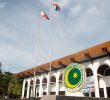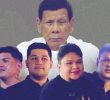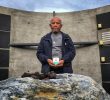By Katherine H.S. Moon
The massacre at Virginia Tech is eliciting a profusion of confusing and off-the-mark public reactions on both sides of the Pacific Ocean. Americans seem not to know where to lay the blame, and Koreans in South Korea seem all too eager to bear collective responsibility and shame for the outrageous acts of a total stranger. Labeling and classifying may be ways for people to make sense of irrational things, but playing with identity politics and cultural differences in not the way to clarify a chaotic situation.
In the immediate aftermath of the violence, the gunman�s identity shifted and mutated in a matter of hours: a Chinese foreign student who had come to the United States a year ago, an Asian-looking male, and Asian male, a male in a Boy Scout uniform, a student from South Korea, a legal resident alien named Cho Seung Hui.
These descriptions shape the way we view the events and individuals involved. For anti-immigration advocates, yet another foreigner is messing up our country and stealing the lives of American youth. As on blogger writes: �Here�s a proposal. All Koreans in America, get out and go back to Korea, the crappy little country where you belong. If we�d thrown all you corrupt ingrates out a year ago, 32 of us would be alive today.� But there were immigrants among the 32 victims from South Asia, China, Romania, Peru, and elsewhere.
According to Salon.com, conservative commentator Debbie Schlussel decalred that a �Paki� was probably responsible, upon hearing that an �Asian� might have been the shooter.
Such remarks should make the public demand information and clarity, not misinformation and incendiary bigotry. Just as all Koreans and Korean-Americans were not responsible for this crime and destruction, all Pakistanis or Romanians or Canadians for that matter wo7uld not be responsible if the gunman been one of �theirs.�
Despite their good intentions, some Koreans and Korean-Americans who have readily offered public sentiments of remorse and contrition are adding to the confusion. One elderly Korean in Seoul lamented to The New York Times, �I and all of South Korean want to apologize to all Americans about what happened.�
Lee Tae Sik, the Korean ambassador to the United states, expressed deep sorrow and sympathy with Americans and called upon Korean immigrants in this country to express regret and apology to the suffering American nation. He also urged Koreans in the U.S. to unite and cooperate with the mainstream of the society. On the other side of the country, state Sen. Paull of Washington (who was born in Korea) uttered, �It hurts me deeply, knowing what happened to Korea and how much the U.S. helped,� in the Korean War.
There is room in Korean culture for collective remorse, guild, grief, and responsibility. It can be a good thing at times, especially when it can help a wayward soul reconnect with the family or larger community or deter an individual from pursuing selfish acts that hurt the larger group. And it certainly is appropriate when as human beings we want to embrace victims and survivors of a tragedy and let them know that �your pain is my pain.� But these gestures and expressions can lift us up only in a cultural context that is familiar to all. What may work in Korea does not necessarily work in America.
The tragedy unfolding minute by minute began as an outrageous criminal act by a mentally disturbed individual. This is not about Korea�s relationship to the U.S. or Korean-Americans� or other immigrants� collective role in U.S. society. One sick young man�s rampage should not invite us to lash out against bilateral relations and differing cultural communities. We should seek to protect and heal not politicize those who have been struck with horror and pain first and foremost, the victims, their families and friends, the gunman�s family, his Centreville, Va., neighbors, and his college campus.
Katharine H.S. Moon (kmoon@wellesley.edu) is an associate professor of political science at Wellesley College and an associate fellow at the Asia Society in New York City. This article originally appeared in The Chicago Tribute, April 20, 2007.










